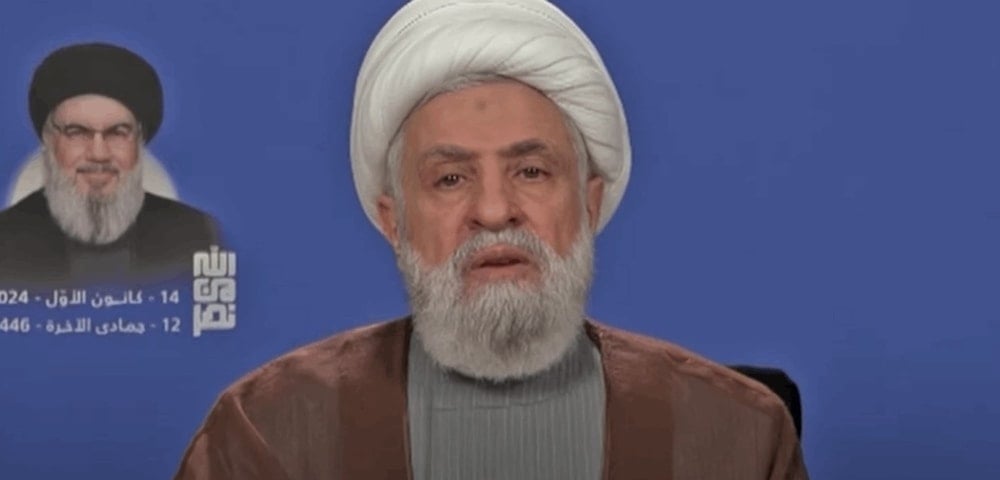Hezbollah, LAF thwarted 'Israel's' expansionist goals: Sheikh Qassem
Hezbollah's chief outlines the group's key objectives for the coming phase, which include implementing the ceasefire deal, reconstruction efforts, and the election of a new Lebanese president.
-

Hezbollah Secretary-General Sheikh Naim Qassem gives a televised speech, on December 14, 2024 (Al Mayadeen)
Hezbollah Secretary-General Sheikh Naim Qassem addressed Saturday evening key local and regional issues, including the recent Israeli war on Lebanon and the latest developments in Syria.
In a televised speech, Sheikh Qassem confirmed that Hezbollah had anticipated Israeli aggression against Lebanon at any moment, without knowing the exact timing, a sentiment he said had existed both before and after Operation Al-Aqsa Flood.
He explained that the Israeli aggression that was waged in September was not related to Hezbollah's support front for Gaza but rather connected to "Israel's" expansionist project.
Sheikh Qassem added that "Israel" managed to assassinate Hezbollah leaders, most notably the group's former Secretary-General Sayyed Hassan Nasrallah, and committed brutal crimes against civilians. However, he emphasized, the Resistance's fighters were able "to inflict pain on the enemy, engage in combat, wound hundreds of its soldiers, and prevent it from achieving its goal of crushing the Resistance."
Sheikh Qassem reiterated that the Resistance had thwarted "Israel's" war objectives and displaced its settlers, underscoring that the occupation's efforts to break Hezbollah had ultimately failed.
"The only achievement the enemy made was causing us pain by killing our commanders," he acknowledged.
The Lebanese leader pointed out that "the enemy seeks to eliminate any resistance that stands in the way of its regional project, stressing that "the aggression is the problem, not the resistance" and that the Resistance would never surrender.
Sheikh Qassem pointed out that Hezbollah succeeded in foiling "Israel’s" central goal of eliminating the Resistance and returning displaced Israeli settlers to northern occupied Palestine without an agreement.
"The enemy realized that the prospect of confronting Hezbollah's Resistance was blocked, so it resorted to an agreement to halt the aggression," he added.
Moreover, Hezbollah's Secretary-General said the group "prevented the enemy from entering the New Middle East with Lebanon being its gateway," asserting that were it not for the steadfastness of the Resistance fighters, "Israel" would have reached Beirut and begun its subsequent steps of settlement and colonization.
According to Sheikh Qassem, the Resistance, along with its people and the Lebanese Army, prevented "Israel" from achieving its expansionist goals in Lebanon.
Touching on the ongoing Israeli violations of the ceasefire agreement with Lebanon, Sheikh Qassem explained that Hezbollah had tolerated hundreds of such violations to help implement the deal and avoid obstructing efforts, asserting that the Lebanese government and the committee tasked with monitoring the ceasefire agreement bear responsibility for addressing these breaches.
He also outlined the group's key objectives for the coming phase, which comprise implementing the agreement south of the Litani River, pursuing reconstruction efforts, electing a new president for Lebanon, engaging in a positive dialogue on problematic issues, such as Lebanon's position on the Israeli occupation of its land and how to strengthen the Lebanese army, and determining the Lebanese defense strategy.
Hezbollah adaptable in the face of shifting conditions
Discussing Syria's political landscape, the Hezbollah leader said the regime had fallen at the hands of new forces but stressed that these forces could only be judged once they stabilize and adopt clear positions.
He acknowledged the loss of the Resistance's military supply route through Syria but downplayed its significance, calling it "a minor detail" and emphasizing Hezbollah's adaptability in the face of shifting conditions.
Despite ongoing challenges in Syria, Sheikh Qassem did not foresee the developments in Syria negatively impacting Lebanon, expressing hope that the neighboring country would stabilize in line with the desires of its people.
"We supported Syria because it was positioned against Israel," Sheikh Qassem recalled, also expressing hope that Syria's new leadership would continue to regard "Israel" as an enemy and refrain from normalizing ties with it.
Read more: Hezbollah condemns Israeli aggression on Syria, calls for unity

 4 Min Read
4 Min Read










